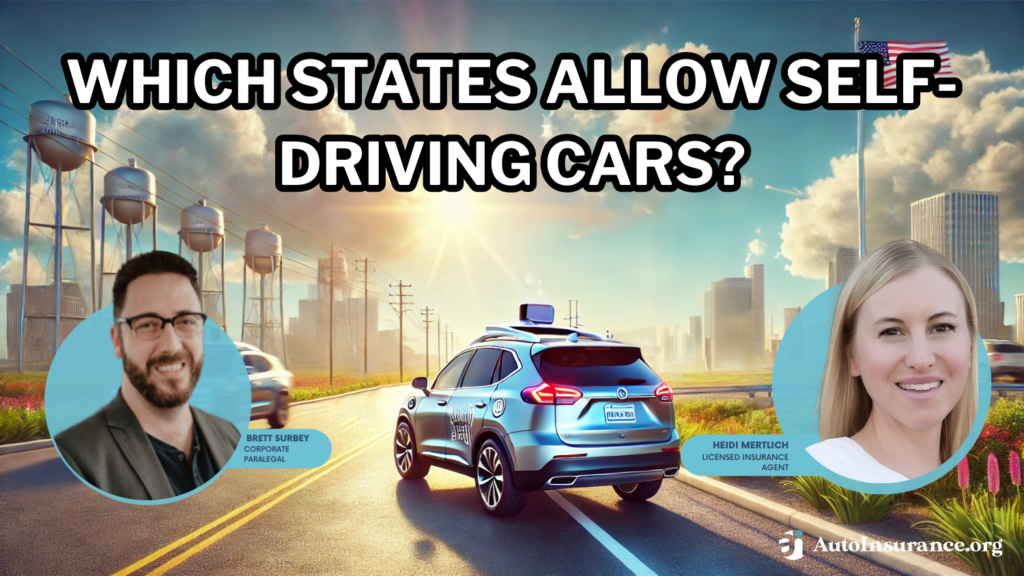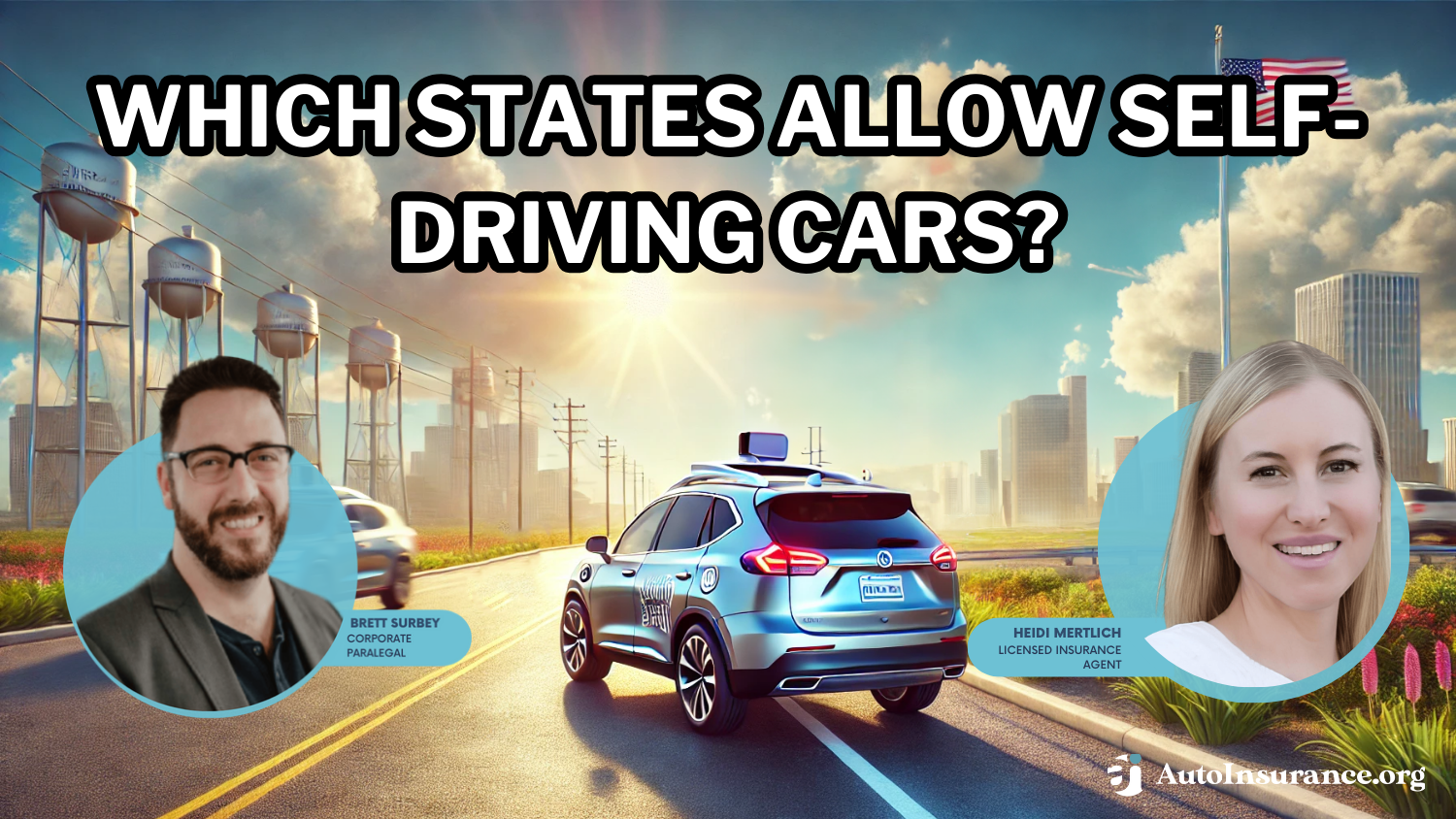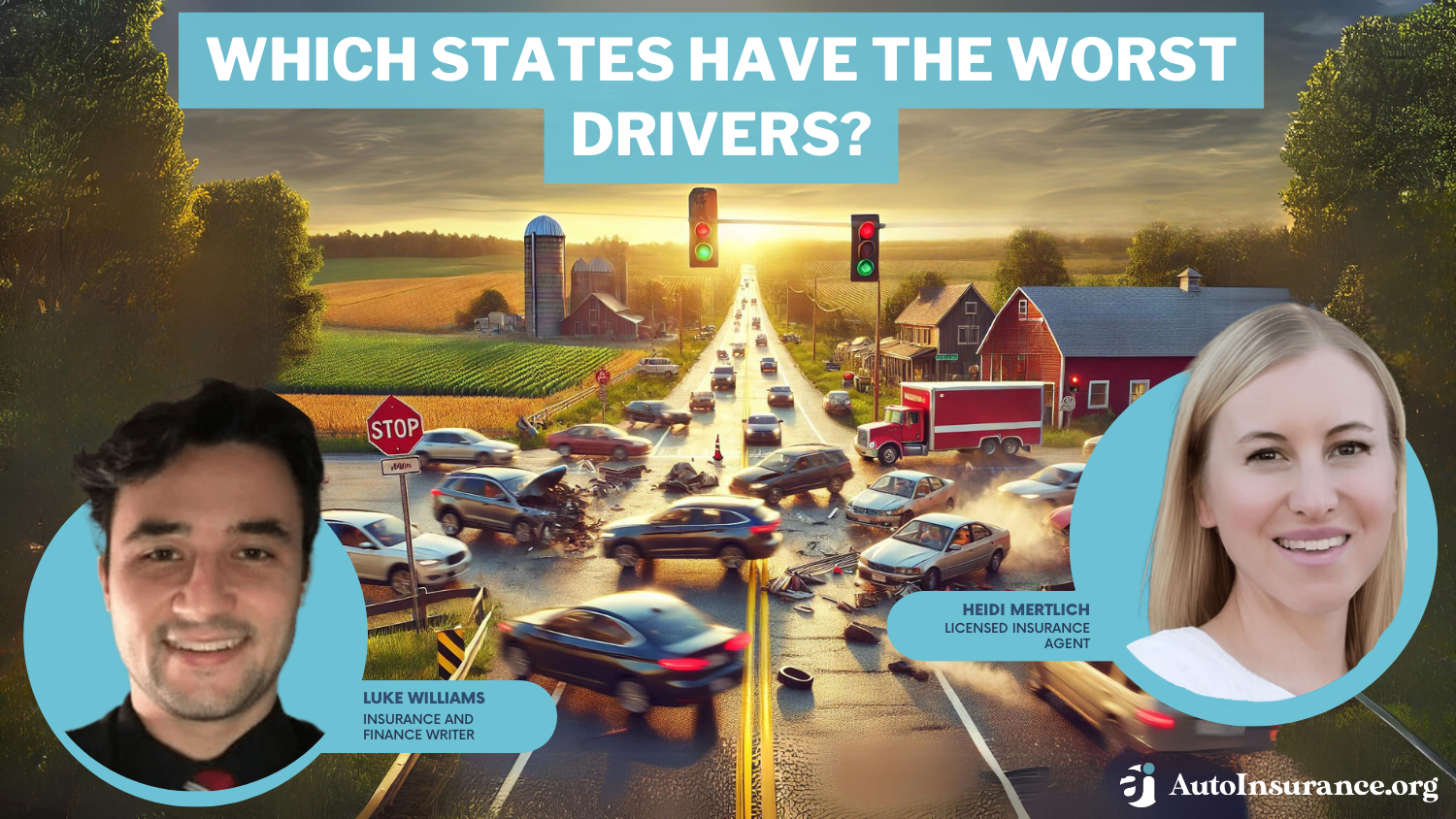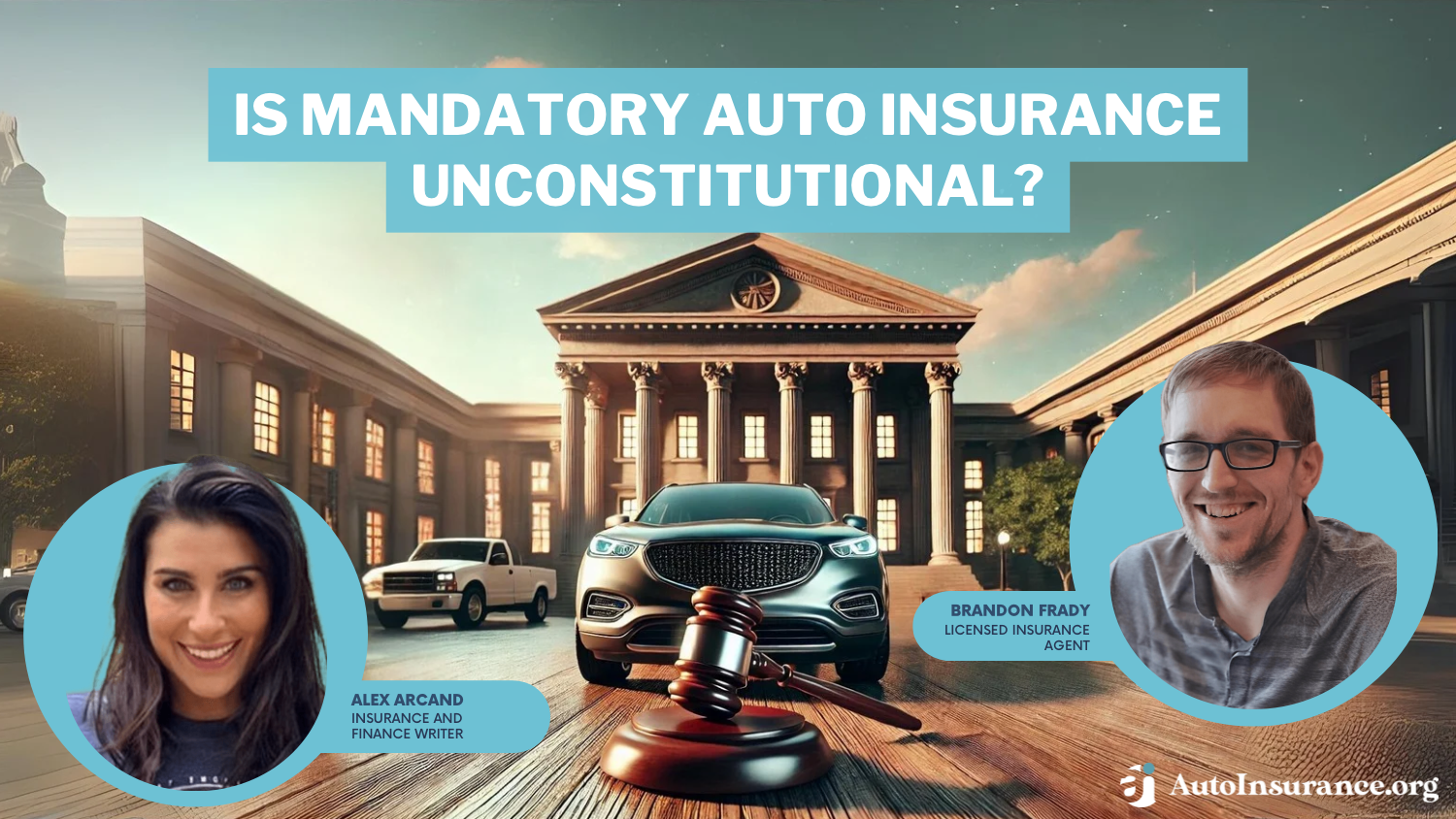Which states allow self-driving cars? (2026)
You may need to know which states allow self-driving cars since companies like Tesla are working to make autonomous vehicles a reality. Although self-driving cars are legal in all states, 29 have autonomous vehicle laws. Auto insurance requirements are the same whether or not a driver is behind the wheel.
Read more Secured with SHA-256 Encryption




Table of Contents
Table of Contents


Corporate Paralegal
Brett Surbey is a corporate paralegal specializing in tax reorganizations and the creation of corporations so they can successfully navigate all aspects of their business and mitigate risks where necessary. He has assisted lawyers on a number of enigmatic transactions, including M&As, complex corporate succession plans, and amalgamations. In addition to his legal career, he is a known e...
Brett Surbey


Licensed Insurance Agent
Heidi works with top-rated insurance carriers to bring her clients the highest quality protection at the most competitive prices. She founded NoPhysicalTermLife.com, specializing in life insurance that doesn’t require a medical exam. Heidi is a regular contributor to several insurance websites, including FinanceBuzz.com, Insurist.com, and Forbes. As a parent herself, she understands the need ...
Heidi Mertlich
Updated December 2024
If you’ve been paying attention to the news, you’ve noticed a rise in the discussion concerning self-driving cars. The automotive industry is working hard to make autonomous vehicles a reality, and we will likely see them on the road soon. And if you own a self-driving car, you might have a lot of questions, like is owning self-driving cars legal?

But which states allow self-driving vehicles? Are self-driving cars legal? And how do different types of car insurance work for an autonomous vehicle? Keep in mind that there is a type of driverless car called FSD, or “full self-driving.” And what does that mean? Is FSD legal?
While some decisions concerning self-driving cars have already been solidified, plenty still needs to be done to ensure everyone’s safety once the vehicles are on the road. Regulations on self-driving cars may keep increasing, and we may find that the amount of required auto insurance coverage with self-driving vehicles will change as well.
Let’s take a look at self-driving car laws as well as the correlation between insurance and self-driving cars.
- No U.S. states specifically outlaw the use of self-driving vehicles on the road
- There is specific legislation in 29 states concerning the use of self-driving cars
- Depending on the car you drive and where you live, you may find that car insurance rates are higher for self-driving vehicles
States That Allow Self-Driving Cars
So let’s talk about where are self-driving cars legal. What states allow driverless cars? It can be pretty confusing when you try to figure out the states that do and don’t allow autonomous vehicles. As with many other issues, there are many different viewpoints on self-driving cars in the U.S. However, it is not true that some states currently have specific laws that ban autonomous driving.
Currently, 29 states plus D.C. have passed legislation, governors in 10 states have issued executive orders, and nine states have laws that are pending or have failed altogether during the voting process. The remaining states have yet to take any action concerning self-driving cars.
The states that currently have legislation on self-driving vehicles include the following:
- Alabama
- Arkansas
- California
- Colorado
- Connecticut
- District of Columbia
- Florida
- Georgia
- Illinois
- Indiana
- Kentucky
- Louisiana
- Maine
- Michigan
- Mississippi
- Nebraska
- Nevada
- New York
- North Carolina
- North Dakota
- Oregon
- Pennsylvania
- South Carolina
- Tennessee
- Texas
- Utah
- Vermont
- Virginia
- Washington
- Wisconsin
Not all attempts to pass legislation have been successful. Several states have attempted but have failed. Still, some states have yet to address the topic at all. So ultimately, are self-driving cars legal in America? As of now, no state in the U.S. has officially outlawed the use of self-driving cars.
However, as autonomous vehicles get closer to a production date, state laws will likely become more specific. That means in the future what states allow self-driving cars may change.
Free Insurance Comparison
Compare Quotes From Top Companies and Save
Secured with SHA-256 Encryption
Current Laws Regarding Self-Driving Cars
So, once you’ve answered the questions, are driverless cars legal, you will want to know specifics. Laws are difficult to pin down when it comes to autonomous vehicles. For example, in some states, self-driving cars are exempt from specific traffic laws when controlled by electronically coordinated speeds. In other states, various tests require approval before self-driving vehicles are allowed on the road.
Many states in the U.S. have neglected to address the topic of autonomous vehicles altogether. While this is likely to change over time, it is difficult to determine self-driving cars laws as well as where you can and cannot own a self-driving car for everyday use. Unfortunately, that means the self-driving cars regulations are somewhat difficult to pin down.
Legality and Safety of Self-Driving Cars
Here’s a little info about self-driving cars and the law. Congress introduced a bill in 2018 that created a baseline for testing and assessments concerning the operation of autonomous vehicles. Unfortunately, this bill has still not been voted into action. So, are autonomous cars legal? Concerning federal law, there aren’t any rules concerning autonomous vehicles. However, the National Highway Traffic Safety Administration (NHTSA) has suggested specific guidelines for producing and operating autonomous vehicles.
According to the NHTSA, autonomous vehicles can be safer than those driven by people, but the comprehensive technology to ensure the safety of those vehicles won’t be created and produced until after 2025. Until then, the NHTSA and other testing groups are working to further develop the different levels of autonomous cars, but there is still limited driverless car regulations.
These levels include the following:
- No automation. The driver is responsible for doing all the driving without any help from the vehicle.
- Driver assistance. The vehicle helps steer or speed up/slow down, but the motorist performs all other duties.
- Partial automation. The car helps with one or more systems while the motorist does the rest.
- Conditional automation. The vehicle completes all responsibilities, but the motorist intervenes when necessary.
- High automation. The car completes all driving responsibilities even if the driver does not intervene.
- Full automation. The vehicle completes all duties without a driver on all roads in all conditions.
With each new level of automation comes a higher dependence on the machine and the technology involved to navigate and operate a vehicle. Some of the most significant benefits when the U.S. reaches fully automated vehicles include safety, mobility, efficiency, and convenience.
These regulations will directly impact the answer to the questions, “is full self driving legal?” and “are fully autonomous cars legal?” The different levels of automation for self-driving cars means that laws regarding self-driving cars cannot always be generally applied.
Companies Working on Self-Driving Vehicles
Several companies are working on autonomous vehicles at the moment. Tesla, Cruise, Waymo by Alphabet Inc., and Aurora are just a few. These companies have enjoyed billions of dollars in investments over the past 10 years. Now, investors are pressuring companies to make and develop the finished product.
You might ask, what states have Waymo? And is Tesla self driving legal? What about is Tesla autopilot legal?
There is no current framework for a national set of rules and regulations for self-driving cars in the U.S, which means there are no set autonomous vehicle state laws. As a result, certain companies have been able to produce and utilize self-driving vehicles at a micro-level.
For instance, some autonomous vehicle companies have deployed robo-taxis and self-driving trucks in limited areas of Arizona and Texas. Since there are few instances of driverless cars in Arizona and driverless trucks in Texas, there’s not too much to be concerned about right now.
Similarly, Waymo has provided thousands of rides to people in robo-taxis in Phoenix, a similar idea to driverless Ubers, though access to all of these services is difficult to find.
Free Insurance Comparison
Compare Quotes From Top Companies and Save
Secured with SHA-256 Encryption
Pushback Concerning Self-Driving Vehicles
People have always been skeptical of autonomous vehicles and worry about the consequences of making self-driving cars legal. Most people cite a genuine concern for safety and control over their cars and are not quite as concerned about where are driverless cars legal. In addition, unions throughout the U.S. disapprove of using self-driving vehicles in the commercial space.
Many believe autonomous vehicles could cause hundreds of thousands of people to lose their jobs in manufacturing and front-line transportation and thus want to increase the laws for self-driving cars. This number will grow if laws are not passed to regulate the use of self-driving cars and trucks.
Union members and average citizens are concerned that there is not enough information about accidents and other safety data regarding autonomous vehicles. Additionally, because motor vehicle companies are legally allowed to certify that a particular feature is safe, many are concerned about the long-term effects of limited testing.
Self-Driving Cars Don’t Need Different Insurance
One aspect that drivers may be interested in is driverless cars and insurance. As of now, self-driving cars will require the same types of auto insurance and amounts of coverage as every other vehicle on the road.
However, car insurance requirements vary from state to state, so insurance requirements for autonomous cars will likely also vary which is why so many drivers ask, what states allow autonomous vehicles? And others wonder, are driverless cars legal in the US? When will self driving cars be legal all over the US?
Once autonomous vehicles become a reality, we may see insurance requirements for those vehicles shift and adapt. This will likely result from data concerning accidents and other damage risks.
Which states allow self-driving cars? The Bottom Line
Ultimately, are self driving cars legal in the US? Yes. But what states allow self driving cars? Well, autonomous vehicles are being developed rapidly, and it’s likely that we will see them on the road and available for personal use within the next few years. But where you live will dictate whether you can use your self-driving vehicle. So is autonomous driving legal? That depends on where you live.
If you’re asking are self-driving cars legal anywhere? No, not yet. While laws exist on a state level now, we may get clear federal regulations as developments progress.
Since there are many companies working on autonomous vehicles, the way we drive may change sooner rather than later.
Some people have concerns about the safety of autonomous vehicles, and unions have pointed out how the use of self-driving trucks may negatively impact the workforce. All of these factors may affect when autonomous cars are produced and how we are legally allowed to use them as well as help to answer the question are self-driving cars legal in the US?
If you purchase an autonomous vehicle in the future, pay attention to insurance requirements. If possible, carry more coverage than is legally required to be better protected if you’re ever in an accident.

Frequently Asked Questions
How will self-driving cars impact transportation and urban planning?
Self-driving cars could transform commuting, travel, and urban planning by increasing efficiency and reducing congestion. Ride-sharing and infrastructure changes may become more prevalent.
Are there privacy concerns with self-driving cars?
Privacy concerns may arise due to data collection and processing. Companies must adhere to privacy laws, but consumers should be aware of privacy policies and practices.
How do insurance companies approach self-driving cars?
Insurance companies are adapting policies to provide insurance for self-driving cars and considering specialized coverage. how will autonomous cars affect insurance? Specific requirements and premiums vary among providers and states.
What is the timeline for widespread adoption of self-driving cars?
The timeline for widespread adoption is uncertain, depending on technology advancements, regulations, and public acceptance. Estimates range from the next decade to longer.
How do self-driving cars work?
Self-driving cars use sensors, cameras, AI algorithms, and onboard computers to perceive and interpret the environment, enabling them to operate without human intervention.
Are self-driving cars available for purchase?
Fully autonomous self-driving cars are not widely available for purchase yet. Some vehicles have advanced driver-assistance systems (ADAS) with certain autonomous features.
What is the difference between Tesla autopilot and self-driving?
So you want to know the features of autopilot vs full self driving cars. Tesla offers two different options — cars with autopilot or full self-driving cars. Is autopilot legal? It depends on where you live. Check your state’s regulation of self-driving cars to find out the details.
Get a FREE Quote in Minutes
Insurance rates change constantly — we help you stay ahead by making it easy to compare top options and save.






